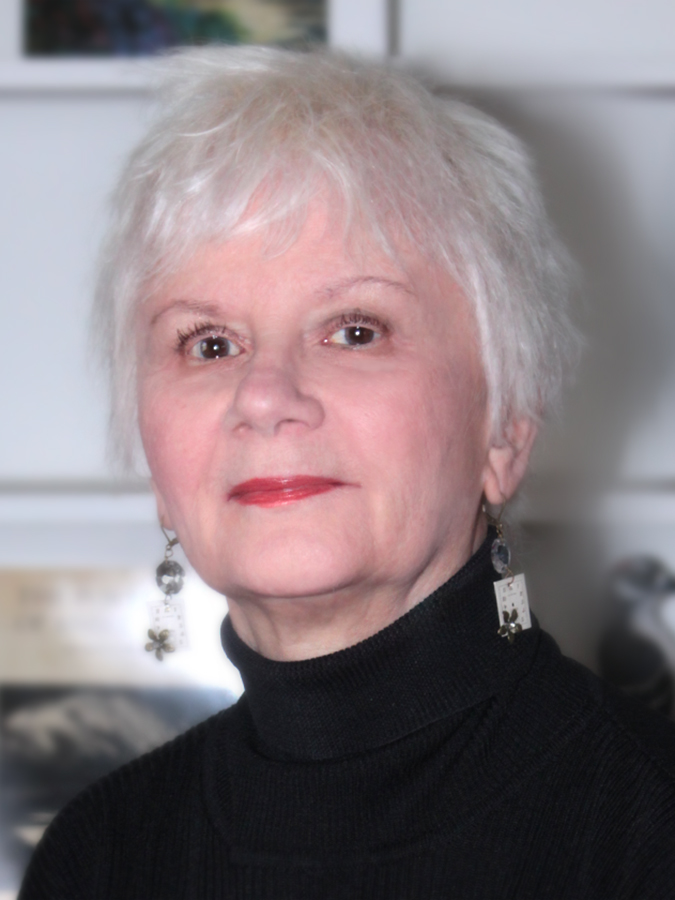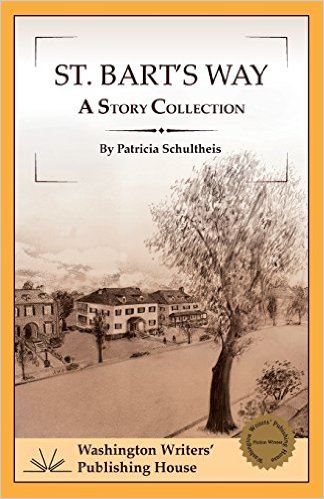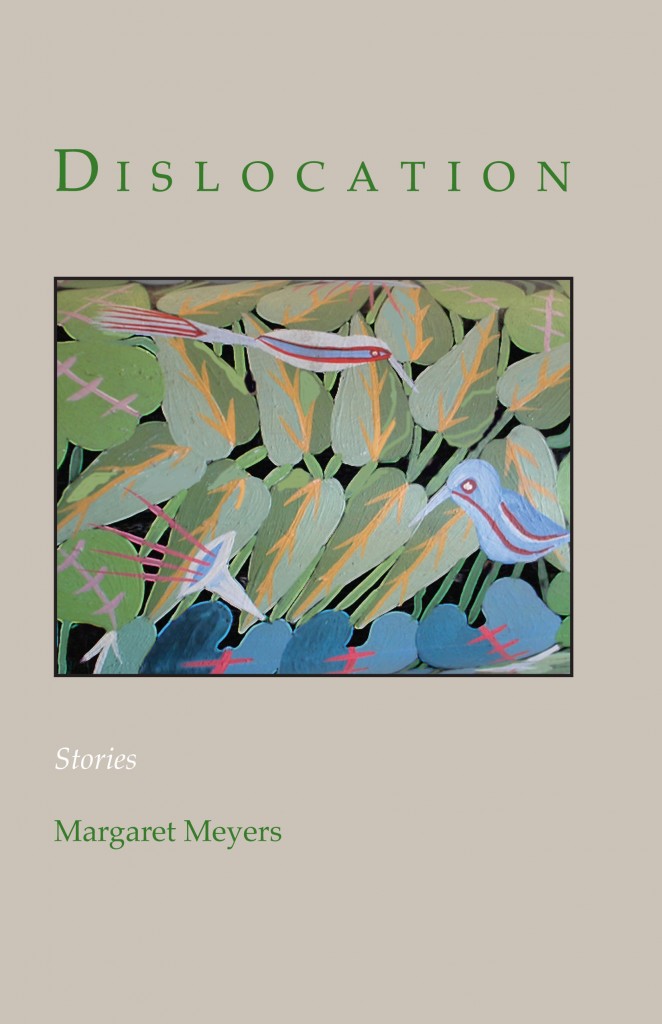Tag Archives: short stories
Book Review: Brief but Indelible, These Two Slender Volumes Make a Big Impression
Book Review: Hurry Up and Relax
Perhaps, like me, you’re one of those people who, finding yourself in a crowd, looks around and wonders at the individual lives of each of the people surrounding you. The tattooed barista with half-shaved/half-purple hair, the guy with the sweat-stained underarms staring into the lingerie store display, the middle-aged business man shouting into his phone as though this were still 2005.
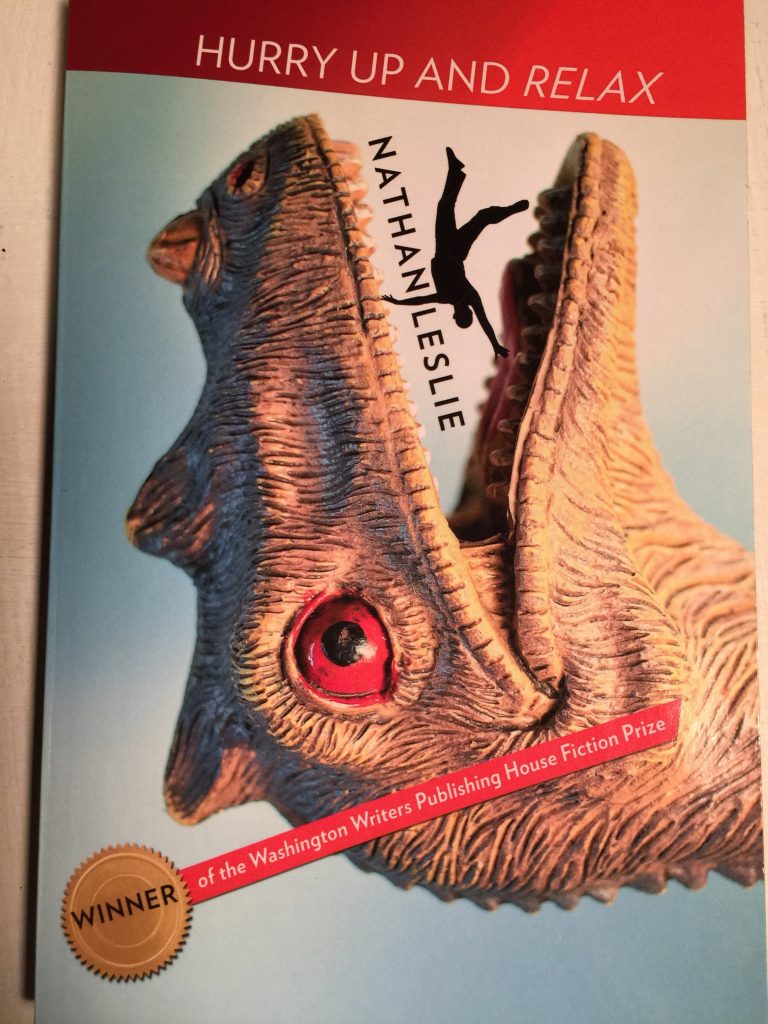
Hard as it is to imagine, all of these people have their own history, their own movie in which they star, their own universe in which they are the omnipotent point of view.
Well, Nathan Leslie imagines it. In Hurry Up and Relax—Leslie’s tenth book, coming out in October, the winner of the Washington Writers Publishing House 2019 Fiction Award—his darkly comedic eye takes in the refugees from the real estate bubble, the hostages of the gig economy, the Facebook stalkers, the Internet gamers trapped on the couch in permanent twilight.
Book Reviews: Recent Releases Ripe for Reading
One of the great joys of participating in the D.C. area writing community is getting to know so many of the exceptionally talented authors who call the area home. An added bonus is learning some of the backstory behind their work, including what it took to bring to publication. Here are two books from D.C. writers that were just released in October.
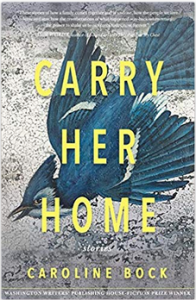 Carry Her Home, Caroline Bock, Washington Writers Publishing House, 2018, 218 pp.
Carry Her Home, Caroline Bock, Washington Writers Publishing House, 2018, 218 pp.
This collection of flash fiction and longer stories, many of which are inter-related, is fully, deliciously unexpected. From the first tiny but densely meaningful story, “The Understanding”, and the second, “O, Tomato,” which reads like prose poetry, it doesn’t take long to catch the rhythm of the stories and a sense of direction, and to realize that what remains unstated carries as much weight as what is on the page.
Little Town, Big Exposure: A Visit to the 9th Annual Gaithersburg Book Festival
Bad Weather Doesn’t Stop Book Lovers
In the opening hours of the Ninth Annual Gaithersburg Book Festival, the skies were an ugly steel gray and the precipitation shifted across mist, sprinkle, drizzle, and steady rain — and still the book lovers came out in force. Sporting umbrellas and rain ponchos, they were ready to hear their favorite authors read from and discuss books at the different literary tents, browse the new and used bookstores and independent booksellers, get their books signed while chatting with those favorite authors, grab something tasty from the food vendors, and go back again for more.
Of the many book festivals that the Baltimore-Washington area now enjoys, Gaithersburg is my personal favorite. Though it often draws over twenty thousand attendees and attracts many nationally known authors, it still has a very intimate feeling.
Short Story Collection: Don’t Wait to Be Called
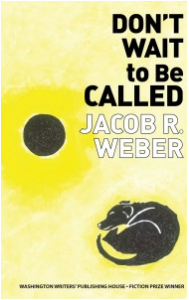 At the Washington Writers Conference coming up in May, I’ll be moderating a panel with four local authors whose debut books made it to publication through very different paths. Each book is also a different genre — memoir/journalism, biography, novel, and short story collection — which means I’m reading four very different books to prepare for the panel.
At the Washington Writers Conference coming up in May, I’ll be moderating a panel with four local authors whose debut books made it to publication through very different paths. Each book is also a different genre — memoir/journalism, biography, novel, and short story collection — which means I’m reading four very different books to prepare for the panel.
The short story collection, Don’t Wait to Be Called, is by Jacob R. Weber. Publication resulted from Weber’s winning the annual fiction prize given by Washington Writers’ Publishing House, a non-profit small press that publishes authors from the Baltimore/Washington area. Weber’s roots, which are on display in his stories, hedge towards the Baltimore end of that geography.
Weber’s biography reads like someone who has lived a few different lives, as a Marine, a translator, and an English tutor to adult immigrants, as well as a waiter and a retail clerk and manager.
Reading Elizabeth Strout as a Writer Would
A Writer Reads Elizabeth Strout
 Writing fiction will change the way you read it. I often make a point of reading like a writer (to borrow Francine Prose’s book title), examining what the author is trying to do and how she’s doing it, determining what works and what doesn’t (and why), and looking for how this can help improve my own writing. It doesn’t stop me from reading as a reader—enjoying good literature and losing myself in fictional worlds—but I rarely lose sight of what the author is doing to and for me.
Writing fiction will change the way you read it. I often make a point of reading like a writer (to borrow Francine Prose’s book title), examining what the author is trying to do and how she’s doing it, determining what works and what doesn’t (and why), and looking for how this can help improve my own writing. It doesn’t stop me from reading as a reader—enjoying good literature and losing myself in fictional worlds—but I rarely lose sight of what the author is doing to and for me.
And when I read really good fiction—the kind that strikes a chord deep within—the writer in me usually has two reactions. First, I’m inspired and I want to rush to the computer to try to create a similar gift for my readers.
KNOW THE MOTHER Shows What Flash Fiction Can Do
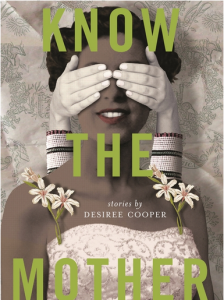 Though she loves to read novels, author Desiree Cooper found that her fiction comes from her in a much shorter form. “If there was no such thing as flash fiction, I would have had to invent it,” says the 2016 debut author of the collection of flash fiction titled Know the Mother. If you’re not terribly familiar with flash fiction, which works to tell an evocative story in a very compressed space, this lovely, haunting collection demonstrates just how effective and affecting this genre can be.
Though she loves to read novels, author Desiree Cooper found that her fiction comes from her in a much shorter form. “If there was no such thing as flash fiction, I would have had to invent it,” says the 2016 debut author of the collection of flash fiction titled Know the Mother. If you’re not terribly familiar with flash fiction, which works to tell an evocative story in a very compressed space, this lovely, haunting collection demonstrates just how effective and affecting this genre can be.
Mother’s stories have a strong common thread of dreams delayed or abandoned — suppressed under the weight of obligation — and of how identity is tied to those dreams. Who are we, really, if we’re never allowed to be who we want to be?
Short Story versus Novel Writing
I consider myself a novelist not a short-story writer. In fact, I’m not satisfied with any of the three-dozen shorts in various stages of development that occupy a directory on my harddrive. Writing short stories is very different than writing novels. Some people think it’s best to start out with shorts and then move on to novels. That may work for some, but to me it’s like thinking you would be good at bull-riding because you can ride a horse.
A novel is not just a long short story. Psychologically it requires a much greater commitment because it can take months or even years to complete a 90,000-word novel. Most short story writers don’t need help deciding when their story is ready for public consumption.
INTERVIEW WITH PATRICIA SCHULTHEIS, AUTHOR OF ST. BART’S WAY
One of Patricia Schultheis’s greatest strengths as a writer is her ability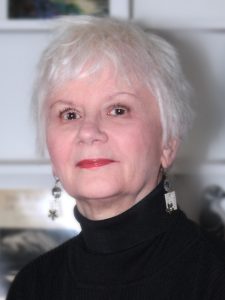 to examine relationships between people. She’s also very good at exploring relationships people have with expectations, rules, traditions, and other conventions of life. In her short story collection St. Bart’s Way, which I reviewed here last month, she offers a host of individuals, all trying to understand life and their role in it, particularly as it relates to others. In the interview below, Schultheis talks about how she creates these characters and how they come to inhabit her stories.
to examine relationships between people. She’s also very good at exploring relationships people have with expectations, rules, traditions, and other conventions of life. In her short story collection St. Bart’s Way, which I reviewed here last month, she offers a host of individuals, all trying to understand life and their role in it, particularly as it relates to others. In the interview below, Schultheis talks about how she creates these characters and how they come to inhabit her stories.
Schultheis’s other publications include her pictorial history Baltimore’s Lexington Market and numerous short stories and essays in national and international literary journals.
BOOK REVIEW: ST. BART’S WAY BY PATRICIA SCHULTHEIS
When I was a little girl, I loved riding home from my grandparents’ house with my 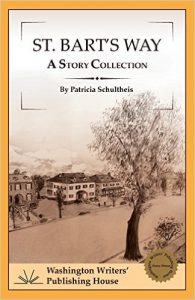 parents after dark. It was one of the few times I was in a car at night, and I was fascinated by the lights in the windows of the houses that lined the two-lane highway that led from my hometown to my grandparents’ farm. In my child’s understanding of the world, those lights suggested warmth, a refuge from the darkness our car was plowing through. St. Bart’s Way, a collection of short stories by Patricia Schultheis, is like looking at the lights inside those windows and seeing all the way into the residents’ souls. But what’s inside is not always refuge, and what refuge there is isn’t easily earned.
parents after dark. It was one of the few times I was in a car at night, and I was fascinated by the lights in the windows of the houses that lined the two-lane highway that led from my hometown to my grandparents’ farm. In my child’s understanding of the world, those lights suggested warmth, a refuge from the darkness our car was plowing through. St. Bart’s Way, a collection of short stories by Patricia Schultheis, is like looking at the lights inside those windows and seeing all the way into the residents’ souls. But what’s inside is not always refuge, and what refuge there is isn’t easily earned.
THE PATHOS OF THINGS
THIS IS NOT A REVIEW BY SONIA LINEBAUGH
This is not a review of British author Kazuo Ishiguro’s Nocturnes: Five stories of Music and Nightfall. It’s a meditation on impermanence inspired by his writing.
Mono no aware is the Japanese idea of the pathos of things, expressed by Ishiguro as sensitivity for a past that seeps into the present of his characters’ lives. Their lives exist as words on paper, bound up in paragraphs of unresolved melancholy, tied inextricably to the falling of the day.
2/1/2015 GUEST BLOGGER CLIFFORD GARSTANG
MORE THAN MERE SETTING
When we first study creative writing, we’re told that the principal elements of fiction are plot, character, and setting. My sense is that teachers of writing spend a good deal more time on plot and character than they do on setting. Perhaps that’s justified. After all, the plot of a novel or short story is essential, whether it’s an action-packed thriller or a psychological drama. Without the plot there is no story. And it is widely recognized that plot and character are inextricable. Plot—a convincing plot, anyway—arises from character, and the reader learns about the characters in a work of fiction from observing how those characters react to the complications that develop in the plot.
But what about setting?
AUTHOR CLIFFORD GARSTANG IS GUEST BLOGGER ON FEBRUARY 1
01/29/2015 AUTHOR CLIFFORD GARSTANG IS GUEST BLOGGER ON FEBRUARY 1
For author Clifford Garstang, the setting in a story is crucial. As he said in an interview here last month, “[Setting] is part of the reason I read fiction. I want to be transported, not only to whatever the story is but also to the place.” As you would expect, setting plays an important role in Garstang’s award-winning writing, including In an Uncharted Country, a collection of short stories, and What the Zhang Boys Know, a novel-in-stories. In Everywhere Stories: Short Fiction from a Small Planet, a collection that Garstang curated and edited, each story takes place in a different country. As our guest blogger on February 1, Garstang will explain why the best fiction uses setting as more than just a backdrop.
said in an interview here last month, “[Setting] is part of the reason I read fiction. I want to be transported, not only to whatever the story is but also to the place.” As you would expect, setting plays an important role in Garstang’s award-winning writing, including In an Uncharted Country, a collection of short stories, and What the Zhang Boys Know, a novel-in-stories. In Everywhere Stories: Short Fiction from a Small Planet, a collection that Garstang curated and edited, each story takes place in a different country. As our guest blogger on February 1, Garstang will explain why the best fiction uses setting as more than just a backdrop.
INTERVIEW WITH CLIFFORD GARSTANG, AUTHOR OF IN AN UNCHARTED COUNTRY AND WHAT THE ZHANG BOYS KNOW
1/10/2015—INTERVIEW WITH CLIFFORD GARSTANG, AUTHOR OF IN AN UNCHARTED COUNTRY AND WHAT THE ZHANG BOYS KNOW
I discovered Clifford Garstang through his excellent blog “Perpetual Folly.” I was looking for information for a SheWrites.com blog post I was writing about literary magazines, and Garstang had the information right there when I needed it. So I started reading his blog and realized that his writing is both engaging and provocative. His collection of short stories, In an Uncharted Country, won the Maria Thomas Fiction Award and the IPPY Gold Medal for Best Regional Fiction–Mid-Atlantic 2010. His novel in stories, What the Zhang Boys Know, won the 2013 Library of Virginia Award for Fiction. Most recently, Garstang served as curator and editor of Everywhere Stories: Short Fiction from a Small Planet, published in 2014.
looking for information for a SheWrites.com blog post I was writing about literary magazines, and Garstang had the information right there when I needed it. So I started reading his blog and realized that his writing is both engaging and provocative. His collection of short stories, In an Uncharted Country, won the Maria Thomas Fiction Award and the IPPY Gold Medal for Best Regional Fiction–Mid-Atlantic 2010. His novel in stories, What the Zhang Boys Know, won the 2013 Library of Virginia Award for Fiction. Most recently, Garstang served as curator and editor of Everywhere Stories: Short Fiction from a Small Planet, published in 2014.
Book Review: Dislocation by Margaret Meyers
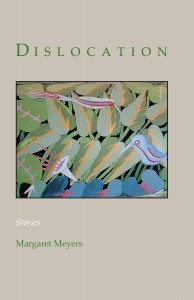 4/7/14 – BOOK REVIEW: DISLOCATION BY MARGARET MEYERS
4/7/14 – BOOK REVIEW: DISLOCATION BY MARGARET MEYERS
With more than a million books published each year in the United States alone, it’s all too easy to overlook a wonderful author. Don’t do that to Margaret Meyers, whose new story collection, Dislocation, has just been published by Entasis Press.
Meyers’s multilayered stories are charming, insightful, and significant, with writing that’s filled with wit and humor. There’s no better way to capture the power of her prose than to quote it. Consider the opening of Doing Good:
“As the young black woman climbs into the front passenger seat of the VW Bug, Delia, crosslegged in the back, notes that her mother’s ears are still ripe-tomato red. Her mother speaks to the young woman in her calm, warm, Sunday-morning voice but those ears, generally very pale with tiny gold freckles, tell Delia that her mother is very far from calm.”
GUEST BLOGGER BARBARA WESTWOOD DIEHL ON THE ENDURING APPEAL OF THE SHORT STORY
3/1/14 – GUEST BLOGGER BARBARA WESTWOOD DIEHL ON THE SHORT STORY’S ENDURING APPEAL
Yes, I complain about the volume of submissions. (502 in the last 22 days, and 256 of those are short stories.) I complain about the time away from my own writing. I complain about all the administrative tasks of running a literary journal—I won’t put you to sleep with that laundry list—but all those tasks have nothing to do with the intoxicating work of reading hundreds of short stories each submission period. Yes, all of them, not only the stories that we finally publish. I’m humbled , stunned really, to have all those stories entrusted to me.
Preview of March 1 Guest Blogger Barbara Westwood Diehl
2/28/14 – PREVIEW OF MARCH 1 GUEST BLOGGER BARBARA WESTWOOD DIEHL
 When short-story writer Alice Munro won the Nobel Prize in Literature, she said it was a “wonderful thing” for the short story, which she hoped “would come to the fore.”
When short-story writer Alice Munro won the Nobel Prize in Literature, she said it was a “wonderful thing” for the short story, which she hoped “would come to the fore.”
No one would agree more than Barbara Westwood Diehl, who, as managing editor of The Baltimore Review, reads more short stories in a month than most people read in a lifetime. Find out what that’s like–and how she explains the enduring allure of the short story–when her guest blog appears in this space tomorrow.
Interview with Nancy Hartney, Author of Washed in the Water
9/17/13 — INTERVIEW WITH NANCY HARTNEY, AUTHOR OF WASHED IN THE WATER 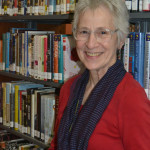
In my review of Washed in the Water earlier this month, I suggested this debut collection of short stories made Nancy Hartney an important new voice of the South. That was very much on my mind when I got a chance to talk to Hartney about her roots, how her upbringing influenced her writing, and how she feels about the region she grew up in. Here is our interview, slightly edited and condensed:
